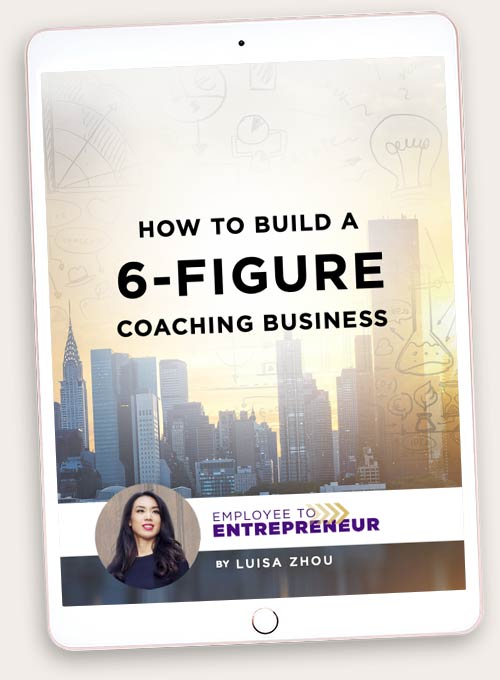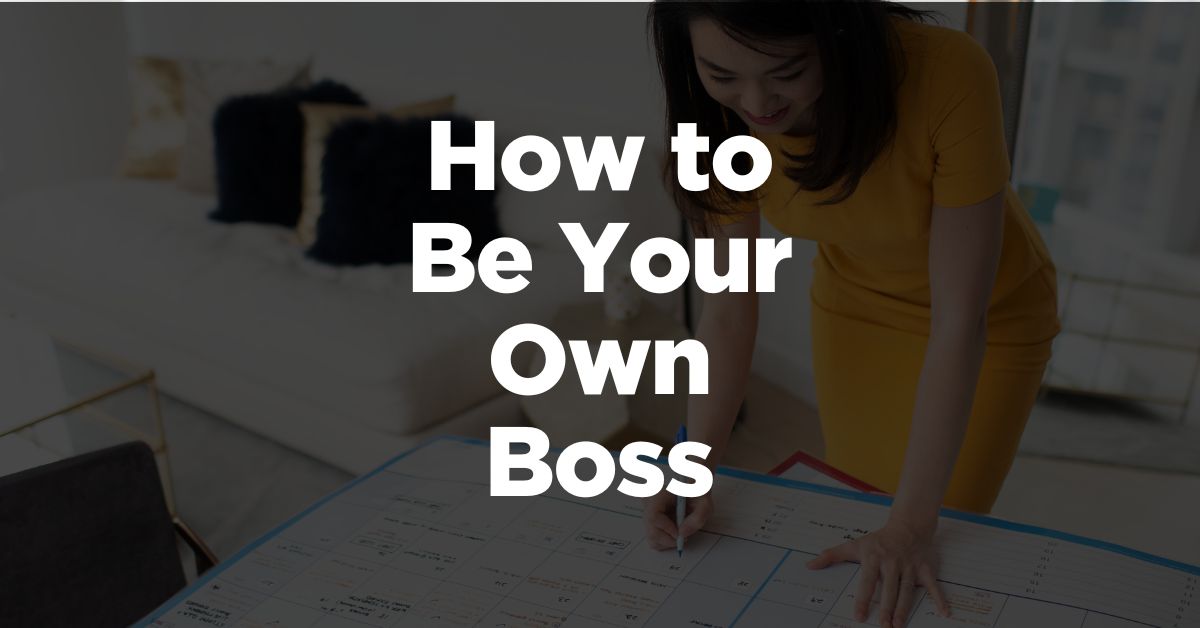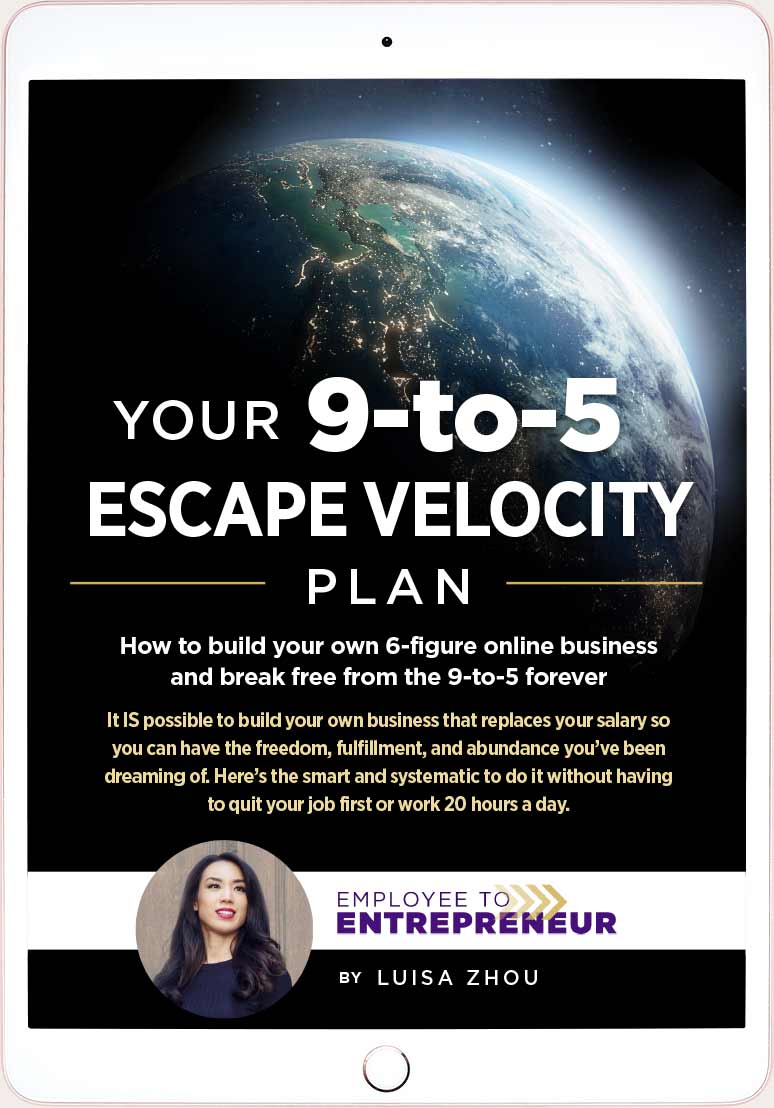Want to free yourself from the 9–5 and be your own boss?
You’re in the right place.
Today, you’ll learn:
- How to become your own boss in 8 simple steps
- The pros and cons of being your own boss
- The 5 best business ideas that will allow you to be your own boss
Let’s dive right in!
We’ll cover…
- How to become your own boss
- The pros and cons of working for yourself
- The best business ideas to stop working for others
How to become your own boss in 8 simple steps
To become your own boss, you need to follow eight key steps:
1. Find a business idea
You probably want to start a business because you want:
- Flexibility to work wherever, whenever
- Freedom to pursue your passion
- The ability to make an impact in your industry
- To be your own boss.
You’re not alone!
There are over 582 million entrepreneurs worldwide, and about 29% of them become entrepreneurs so they can be their own bosses.
Now, you might be thinking “How could I start a business? I don’t have the next big idea.”
Don’t worry – you don’t need to invent the next Amazon to be your own boss.
The truth is the best idea for you is already inside you.
Think about it. You’ve learned skills from your day job, hobbies, and major life experiences – they’re all valuable.
And as you begin this journey of becoming your own boss, you want to make it as simple as possible for yourself.
How? Monetize your existing skills. That way, you don’t have to invest money in developing a product or getting more education.
So what kind of businesses use your existing skills?
The top three are:
- Coaching
- Consulting
- Freelancing
Coaching/consulting was my choice when I wanted to quit my 9-5.
See, I knew I wanted to get started as fast as possible without learning new skills so I identified a problem I could solve with the skills I already had.
After a couple of years of trial and error, I landed on digital advertising consulting, because I had experience working on digital ads in my day job.
And it worked! Four months after starting that business, I made enough to quit my day job and become my own boss.
Now it’s your turn:
Can you identify a problem people have that you can solve with your skills?
But you also need a niche – a target audience. That’s what we’ll look at next.
Get the Ultimate Guide
for building a
6-Figure Coaching Business so you can achieve more freedom!
2. Decide on a niche
Let’s make this simple:
A good niche combines your skills with market demand.
First, your skills.
Brainstorm all of the skills you’ve learned so far that could be viable business ideas.
I mentioned that eventually I chose digital advertising… but I didn’t start there.
My very first business was Excel consulting. I knew a lot about spreadsheets because of my day job. But did I want to build a business around spreadsheets – the least favorite part of my job? The answer was no.
Then I tried career coaching. Having climbed the corporate ladder as an introvert, I had some great insight that could help others.
But that didn’t work out either because I knew I eventually wanted to help people start businesses rather than advance in their careers.
But with digital advertising, my third idea, I was able to work in a field I enjoyed and use my experience to help small business owners.
Still stuck? Check out this video on finding a profitable niche.
Next up: Market research.
3. Do market research
Now you have a business idea, is there a demand for it?
Or an even bigger question: Do people want to pay for it?
To figure this out, start with the market you want to work with.
So ask yourself:
- Who might need your services? For example, as a career consultant, you could work with new college grads, mid-level career women, or executives at Fortune 500 companies.
- Who can pay for your services? Following from our previous example, college grads have less income, so they wouldn’t necessarily be ideal. Whereas someone with a bit more work experience could afford your services.
- Who relates to you? You might want to work with top-level executives but what would draw them to you? Do you have experience working with execs?
This is the process my student Spencer Snakard went through. She was a high-level executive in her corporate career but didn’t feel fulfilled. So she created a mindset coaching program for entrepreneurs and leaders who want to live better lives.
Once you have a market in mind, you need to make sure they want what you’re selling.
A simple way to do that is to look for similar businesses to yours.
Are coaching, consulting, or freelancing businesses in your niche doing well?
Are your ideal clients seeking services like yours on LinkedIn, Reddit, or Facebook groups?
These will help you figure out if there’s a market ready and waiting for your services.
4. Figure out when to quit
Now you have a validated business idea, you’re ready to hand in your notice, right?
Not so fast!
So many new entrepreneurs leave their 9-5 way too soon.
Some manage to survive… but very few do. Most of them end up back in a day job, because of financial stress.
So when will you be ready to quit your job?
Here’s a simple framework I call the 3-2-1 rule. You’re ready to quit your job when:
- 3 – You’ve had at least 3 months of consistent sales
- 2 – You’re making 2x your expenses
- 1 – You’ve saved 1 year of expenses in savings
Even achieving one of these will make it way more likely that your business will succeed.
How do you do that?
You need a sales system that reliably brings you new clients.
That’s what I teach my students in my flagship course Employee to Entrepreneur.
Once you’ve set up the system, your main job is to drive people through the system to make consistent sales.
But it takes time to build, and that’s why you shouldn’t walk out of your job yet.
Instead, you have the freedom and flexibility to experiment with your business when you have a 9-5 to support you.
When you are ready to leave, do it professionally.
Hand in your business on time and still show up to do your job well.
Don’t burn your bridges because you never know how your old bosses may help you in the future.
In the next section, let’s talk about finances.
Get the Ultimate Guide
for building a
6-Figure Coaching Business so you can achieve more freedom!
5. Understand your finances
Question: How well do you know your finances?
Now’s the time to get up close and personal with all of your living costs.
That includes:
- Rent
- Bills
- Groceries
- Child/pet care
- Savings
- “Fun” spending
When I was building my business on the side of my 9-5, I cut my expenses as much as I could so I could reinvest in my business.
But how much money does your business really need?
A coaching, freelancing, and consulting business don’t cost much to start or run.
If you work a day job while building your business, you can invest into your business relatively risk-free – while supporting your life with your salary.
Very few people work well with a “burn the bridges” mentality and that’s also why not having a salary to support your life can be detrimental to your business.
I talk more about what it takes to invest in your business here:
6. Learn how to run a business (but don’t overdo it!)
Are you thinking?:
“Luisa, I have never run a business before. Where do I even start?”
Look, there are a ton of resources out there on how to build a business.
You could:
- Follow business blogs – like the one you’re reading right now
- Take courses
- Read books
- Work with a business coach or consultant
But don’t overdo it.
Because the truth is learning is overrated.
Yes, you should invest in yourself and your business.
I spent over $60,000 on coaching, consulting, and courses to help me learn how to build a successful business when I built my business.
However, I didn’t spend an amount that would’ve been risky to me at the time. (I was in a six-figure job.)
And I made sure I was taking action on what I was learning to make sure my business was growing.
Bottom line: It’s only by taking action that you’ll figure out what works for you.
Next, let’s look at how to set up your business.
7. Set up your business
How do you legally set up your business?
It depends on the type of business you’re starting.
If you’re starting a business solo, the two main legal structures are:
- Sole proprietorship
- Limited liability company (LLC)
(You can learn more about them here.)
Most coaches, consultants, and freelancers start with sole proprietorship because there’s less paperwork. On the other hand, e-commerce businesses are best as LLCs.
In short, don’t overcomplicate it.
There’s an easy option for every business and you can always change the legal structure later on (many people do.)
Get the Ultimate Guide
for building a
6-Figure Coaching Business so you can achieve more freedom!
8. Find your first clients
Ready to land your first client? Here are some great ideas:
- Reach out to your network: Let your family, friends, and colleagues know about your services. Adding a referral incentive will boost your chances of getting clients.
- Master a social media platform: Choose one platform to create high-quality, valuable content that will resonate with your audience.
- Guest host on industry podcasts: Reach out to podcasts in your niche and pitch ideas so you can position yourself as an expert.
- Write blogs for industry publications: Pitch article ideas to relevant industry blogs to get your name out there.
- Pitch your services: Find potential clients on LinkedIn or Google and offer a free taster session.
Remember, you don’t need to do all of this at once. I tell my students to focus on one strategy at a time.
Need more advice on booking clients? Check out my video:
What are the pros and cons of being your own boss?
Here are the pros and cons of being your own boss:
Pros
- Flexibility: No commutes, opening times, or set to-do lists. You have the flexibility to work however you want.
- Freedom: You have the freedom to pursue work you’re interested in. Plus you can work anytime from anywhere in the world.
- Higher income: There is no limit as to how much you can earn.
- Impact: You can transform the lives of your clients by building a strong brand.
Cons
- No steady paycheck: You’re not guaranteed to make sales. You also don’t have benefits like retirement plans, sick leave, health insurance, and maternity leave.
- More responsibilities: As an entrepreneur, you are the accountant, designer, marketer, sales manager, and CEO on top of your main client work.
- Hard work: Even though you don’t have to work 24/7, being an entrepreneur is hard work
Get the Ultimate Guide
for building a
6-Figure Coaching Business so you can achieve more freedom!
5 business ideas that allow you to be your own boss
Ready to start your business? Here are some ideas to get you started.
Freelancing
As a freelancer, you provide a done-for-you service for money.
For example, web design, virtual assisting, copywriting, photography, and so on.
Because freelancing has low upfront costs and you can use your existing skills, it’s surprisingly profitable.
Consulting
Consulting is similar to freelancing, but instead of a done-for-you service, you’re selling your advice and expertise.
It’s common for consultants to work in the same field as their 9-5.
Think HR consulting, IT consulting, PR consulting, and so on.
This is a highly profitable business model because you’re using your existing skills and you can charge high-ticket prices for your services.
Coaching
A coaching business is one of the best online businesses you can start.
You can get started straight away with your knowledge so it can be wildly profitable.
Coaching business ideas include:
- Relationship coaching
- Fitness coaching
- Health coaching
- Business coaching
- Career coaching
Online courses
There are few business models as profitable as selling online courses.
After all, you can teach what you know to hundreds or even thousands of people with one product.
Note, though: I don’t recommend starting out with online courses. But a course business is a great business move for coaches, consultants, and freelancers who want to scale their businesses.
E-commerce
An e-commerce business is a company that sells physical or digital products online.
This type of business can be highly profitable and fulfilling.
However, it takes work to develop, source, store, and distribute your products.
For physical products, that could involve design, warehousing, and shipping, which drive up your investment.
It’s easier to sell digital products because you can make and distribute them yourself.
Next steps
So, there you have it! Now you know how to be your own boss.
Need help getting there?
My flagship course, Employee to Entrepreneur, is for you.
This is my tried-and-tested blueprint for building a service-based business that’ll let you quit your corporate job and feel more fulfilled.
Sounds good? Sign up here.

Want to Build a 6-Figure Coaching Business So You Can Achieve More Freedom?
Get Instant Access To My FREE Ultimate Guide Below!
When you sign up, you’ll also receive regular updates on building a successful online business.
Read more:
The Top Fears of Starting a Business + How to Overcome Them
The Most Successful Online Business Ideas
The Best Online Business Courses for Entrepreneurs








